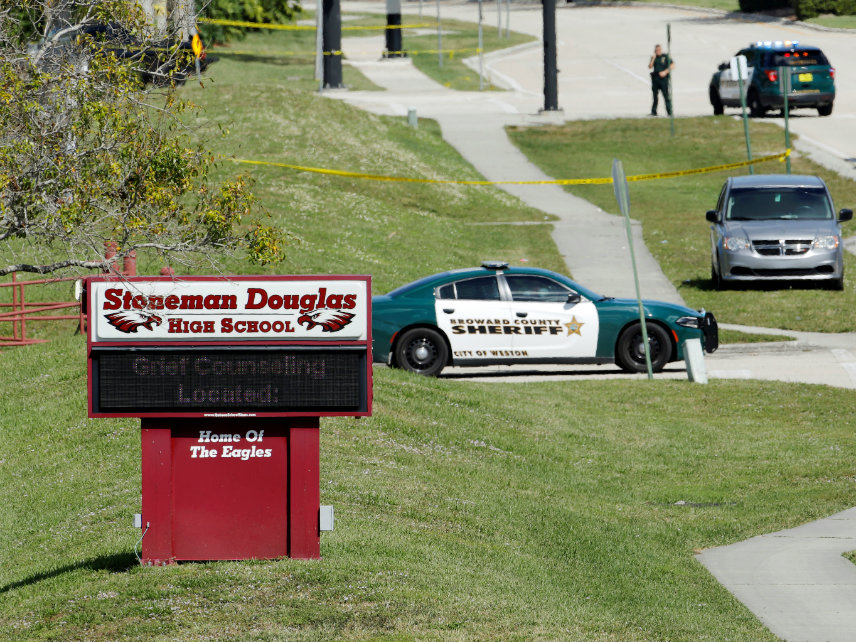Police Unions Defend Bad Cops Who Do Awful Things. Why Won't They Defend Broward County Deputy?
School resource officer Scot Peterson didn't pay his dues. To unions, that's what matters.

Police unions routinely defend bad cops who do awful things.
When Hector Jimenez, an Oakland cop, shot and killed an unarmed man in 2007, he got his job back. Seven months later, after he killed another man by shooting him three times in the back, he got his job back a second time. In both cases, the local police union intervened in Jimenez' favor.
After 13 Cleveland cops fired 137 rounds of ammo into a car in 2012, killing two people, at the end of a car chase, all but one ended up staying on the job with help from the union. The same was true for Philadelphia police officer Cyrus Mann, who was fired that same year after shooting three people within three years (he killed one of his victims, an unarmed man, by shooting him in the back) and later reinstated on the force after a union-backed arbitration process.
Last year, when cops in Salt Lake City violently arrested a nurse for refusing to draw blood from a hospital patient without a warrant, the local police union stepped in to defend the officers' actions and attack those who criticized them.
In those cases, and plenty of others, police unions have defended cops who engaged in clear-cut abuses of the public trust placed in them. Whether it's a question of excessive force, unconstitutional searches, or the killing of innocent civilians, police unions routinely stand up for officers who have committed acts with tragic consequences. Union contracts "often provide a shield of protection for officers accused of misdeeds," Reuters concluded in a 2017 investigative report.
But the head of the union that represents law enforcement in Broward County, Florida, says his union won't be stepping up to help disgraced deputy Scot Peterson, who resigned amid the fallout from the Feb. 14 school shooting.
Why not? It's not because the union is upset with Peterson's conduct or because it thinks he has disgraced the courageous image of law enforcement. No, it's really just about the money.
"From a legal standpoint, we say he was not a 'dues-paying member,'" Jeff Bell, president of the Broward County Sheriff's Deputies Association told Reason.
Peterson was on duty as the school resource officer at Marjory Stoneman Douglas High School when the shooting occurred, but security camera footage shows the deputy remained outside the school while 17 students and teachers were killed. Peterson's conduct has been widely criticized (though he now says he wrongly believed the shots were coming from outside the school building).
"If he was a dues-paying member, I would certainly have a problem with how we are trying him in the public and not giving him his due process," Bell says. "But because he's not a dues-paying member and I don't have to represent him? Whatever happens, happens."
Peterson is covered by the collective bargaining agreements signed by Bell's union, but public sector employees have the right under Florida law to refuse to financially support their union. That doesn't really free employees from the union, as Travis Keels, author of a 2015 study on Florida's public sector union laws. "Even in a right-to-work state such as Florida, many public employees are faced with an unavoidable quandary: Join a union and pay dues, or choose not to join the union and have no voice in the union that will still be representing you regardless of your individual opinion."
In other words, Peterson won't get much help from the union he was nominally part of, but he was not free to find a different bargaining unit that might have served him better.
When the Broward County Sheriff's Office (BCSO) decided to suspend Peterson last week, Bell was asked to call the deputy to give him the bad news. Bell said that was the first time he's interacted with Peterson. The phone call was a difficult one, and Peterson was upset by the way he was being treated by his employer after 32 years of service. Peterson resigned and retired shortly after being suspended. He stands to get a pension of at least $52,000 and will have half of his health insurance premiums covered by the BCSO for the rest of his life.
But Peterson could end up facing an investigation from the BCSO and could end up in civil court due to his inaction at the high school last week.
Whatever happens, Bell says, won't be a union matter.
"If the sheriff's office decides not to, say for example, they decide you know what, we're not going to give you your payouts and we're not going to give you your insurance or whatever, I'm still not doing anything for him," Bell told Reason. "So, he doesn't have the right to file a grievance–well, he can do it as an individual, but when he gets to the level of arbitration, we're not covering that. If he has any lawsuits, we're not covering that. Administrative hearings or civil hearings, we're not covering that."
Only "dues-paying members," get that sort of protection, Bell says.
That demonstrates, in pretty stark terms, the standard that police unions use to measure good cops.
It's certainly possible that Bell's union is making the right decision by refusing to support Peterson—but if that's the case, then what do we make of the countless examples where police unions have gone to bat for officers who have hurt and killed innocent civilians? If this is the right decision, then it's been made for the wrong reasons.
And if paying union dues is the difference between a good cop and a bad cop, then it's no surprise that politically powerful police unions have produced the policy outcomes that they have.
